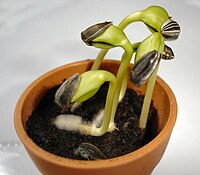
Photo from wikipedia
Several cover crops (CCs) exert allelopathic effects that suppress weed growth. The aim of the present study was to evaluate the effects of aqueous extracts containing different concentrations [0, 0.5,… Click to show full abstract
Several cover crops (CCs) exert allelopathic effects that suppress weed growth. The aim of the present study was to evaluate the effects of aqueous extracts containing different concentrations [0, 0.5, 1, 2.5, 5, 7.5 and 10% (w/v)] of Brassicaceae CCs (Sinapis alba, Raphanus sativus, Camellina sativa) and of the CCs Fagopyrum esculentum and Guizotia abyssinica on germination and early growth of Ambrosia artemisiifolia L. The allelopathic effects were species and concentration-dependent. C. sativa, for example, caused the greatest potential to inhibit germination, shoot, radicle length and fresh seedling weight, whereas S. alba and R. sativus inhibited germination and early growth of A. artemisiifolia only at concentrations ≥7.5%. In contrast, no inhibition was observed when aqueous extracts of F. escultneum and G. abyssinica were added at any of tested concentration. Liquid chromatography-tandem mass spectrometry detected 15 phenolic compounds in Brassicaceae CCs with the highest content (µg/g) of vanillin (48.8), chlorogenic acid (1057), vanilic acid (79), caffeic acid (102.5) and syringic acid (27.3) in C. sativa. Our results suggest that C. sativa is the most allelopathic CCs and that the fruits of C. sativa are the plant organs richest in allelochemicals.
Journal Title: Plants
Year Published: 2021
Link to full text (if available)
Share on Social Media: Sign Up to like & get
recommendations!